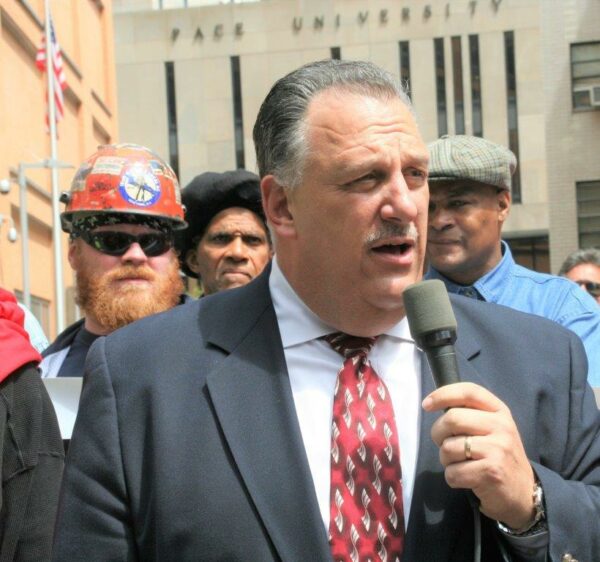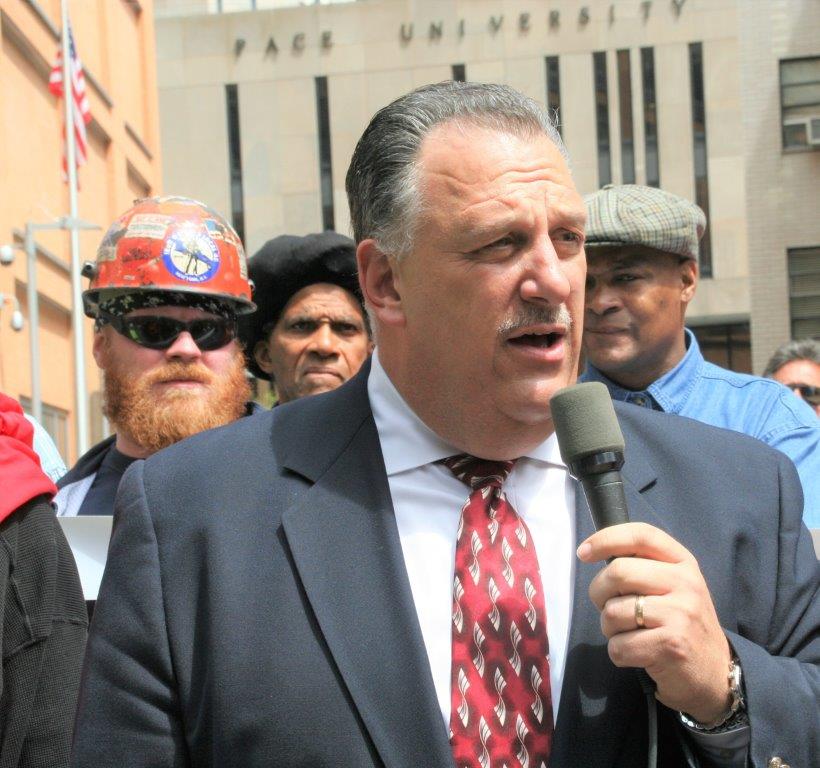With Broadway ticket prices at all-time highs, the mission of the Working Theater, the labor-focused theater company and arts education program, has never been more vital.
The theater company, based in Midtown, fuses community programming to uplift and inspire union members with cutting-edge productions that offer tickets at a sliding-scale of affordability. Its deep connection to a slate of unions including 32BJ SEIU, IBEW, UFT and RWDSU not only draws their members to see theater but centers their struggles in its storytelling.
“Our mission of creating theater with, about and for working people is just a north star of a sentence for us,” said Kylee Brinkman, its managing director. “If we’re doing a play, if it wasn’t written by one of our union members, if it’s not about labor, then why are we doing it? That sentence really sums up how we think about our work and what we should be producing.”
The company began in 1985 when a group of actors came together in downtown Manhattan seeking to start an ensemble theater company. Bill Mitchelson, one of those actors who came from a union background, became a prophet for the mission of making plays for working people.
The theater’s early productions were bold and experimental, not just because they were at the vanguard of the labor movement but also because the founders were interested in taking a downtown aesthetic that was formally fresh and avant-garde and making it accessible.
But by the end of ’80s, the actors in the company started to feel that their work actually wasn’t nearly accessible enough. Thus ensured a second phase of the company informed by the realization that it needed to bring the work out into the community. This meant creating initiatives to provide theater training for union folks. That realization is the root of Working Theater’s “Theaterworks” program, which provides courses in stage writing and performance for union members and continues to be a signature part of the organization.
The theater actually holds some of these classes for 32BJ members in the union’s headquarters in the Siegel-Cooper building. That union offers a variety of development classes for their members to take that include many technical skills, but the Theaterworks program stands out as a form of creative expression that can also build practical organizing skills.
“It can help them with theater, yes, and start their careers in the theater industry, but it can also help them with things like public speaking, communications and indeed organizing efforts themselves,” said Colm Summers, Working Theater’s artistic director.
The classes are typically 12 to 16 weeks and involve a teaching artist coming in to work with students for two to three hours once a week to develop an original play or acting skills.
The program is one of three strands of education and community services the theater offers. Another part is to make sure that union members are able to access the theater. For each of its productions, the theater does outreach to its union partners to offer tickets and make sure they’re reaching working people.
The third side of its program is the artistic wing. Since the early ’90s when the theater started its education efforts, the theater’s production chops only grew under the stewardship of former artistic director Mark Pleasant. He oversaw some groundbreaking productions, including Rob Ackerman’s “Tabletop,” Lisa Ramirez’s “To the Bone,” or Ed Cardona Jr.’s” La Ruta, a play about the migrant crisis that took place across the city in a 16-wheeler flatbed truck.
“What Mark brought to the company was an embeddedness in the labor movement and a real sense of how to provide for working people. He really was a guy who was thinking about trailblazing access in the American theater,” said Summers, who took over his role less than a year ago.
Summers added that his goal is to make sure that theater is “at the center of the labor movement— that we are on the front lines of issues and contract fights and bargaining that are happening right now.”
A good example is the company’s recent support for the RWDSU-affiliated REI Soho Union, where it staged a a reading of a new play by Laura Neal called “Foot Wears House” as part of the union’s labor actions. Summers said that also he’s been building up the theater’s literary department to read as many new plays as possible. It recently embarked on an initiative that will commission a piece of work about the struggles of delivery cyclists.
That’s just one example of the type of live issue that theater is tapping into. In March, it co-produced “Fish” by Kia Corthon with Keen Company, a play about the tensions that emerge when a charter school literally gets put on top of the top floor of a public school.
The theater offers entry to these plays at a cost that working people can afford. Instead of fixed prices every time, it encourages attendees to consider what they can really afford. There’s typically a $0 option, a $10 option, a $30 option or a true-cost option for around $70.
Coming up, the theater is hosting its Bridge and Tunnel Awards and benefit on June 3, where it honors two individuals who have bridged the gap between labor and the arts. The upcoming ceremony will recognize SAG-AFTRA, represented by Rebecca Damon and Michelle Zettergren, president of Labor and Public Sector at MagnaCare.









